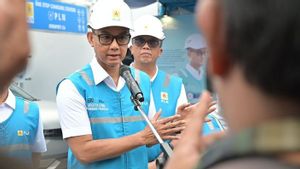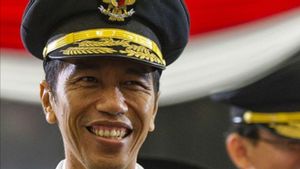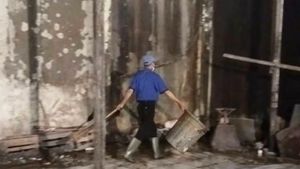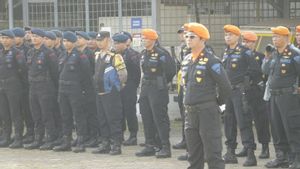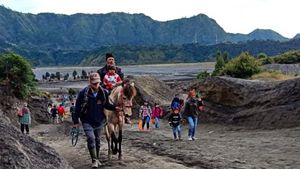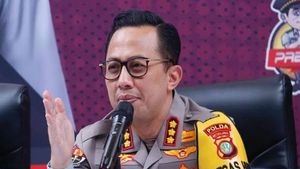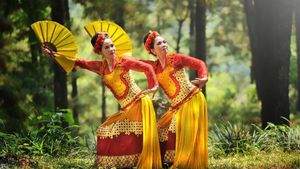March, 2011, a wave of demonstrations against the rule of President Bashar al-Assad started in the city of Daraa, Syria. March, 2018, the death toll due to civil war reached 370 thousand. There are so many things that trigger a devastating escalation of conflict. One of them is radicalism and religious politicization. Muhammad Najih Arromadoni was in Syria at the time, watching the development of the conflict from a social point of view. The symptoms he is now seeing are occurring in Indonesia.
***
Muhammad Najih Arromadoni came to Syria in 2009. At that time he received an undergraduate scholarship from the Indonesian government to study at Ahmad Kuftaro University in Damascus. Najih studied Da'wah and Communication Science until he was later deported in 2012. In Indonesia, Najih taught at the Ushuludin Faculty of the State Islamic University (UIN), Surabaya. He has also served as Secretary General of the Syrian Alumni Association since 2015.
"Of course the Syrian conflict is very complicated, has many factors and involves a lot of actors, from global actors to regional actors to local actors."
Najih Arromadoni
The peaceful uprising against Syrian President Bashar Al-Assad was inspired by the Arab Spring. At that time the governments of two major Arab countries: Tunisia and Egypt were overthrown. Syrian pro-democracy activists smell hope. The restraints of liberty and economic woes are so unsettling. And the repressiveness of the government in handling demonstrations has widened the anger of the Syrian people.
In March 2011, peaceful protests were held in Syria. The trigger was the detention and torture of 15 boys who were caught writing graffiti in support of the Arab Spring. One of the 13-year-old boys out of a dozen children died from the brutal torture of the authorities. The demonstrations did not make the Bashar al-Assad government realize its mistake. The government actually killed hundreds of demonstrators and jailed so many protesters.

July 2011, defection from the military camp occurred. They announced the creation of the Free Syrian Army. The group turned into rebels whose goal was to overthrow Bashar al-Assad. In later times, the conflict that was previously not divided into sects developed into a more sharp sectarian conflict.
Most Syrians are Sunni Muslims. They are confronted by a Syrian security unit which has long been dominated by members of the Alawi sect, of which Bashar al-Assad is a part. The feud between these sects was exacerbated by radicalism and the politicization of religion. This part is what Najih calls a local factor in the Syrian conflict.
"At the global level there are America, Russia and China who are involved. At the regional level there are Iran, Saudi Arabia, Qatar, Turkey, and several other countries. While at the local level there are a lot of terrorist groups in the name of religion within. to achieve their power interests. Among them are ISIS, Jabhat al-Nusra, Jaisyul Islam, Ahfad al-Rasul (the grandson of the Prophet), the Liwa al-Tawhid (tauhid flag) and so on "
Najih Arromadoni
These groups do not only take up arms. They also entered the social and religious life of the Syrian people. They enter the mosque as a religious symbol. The group's leaders also spoke on the pulpit with religious narratives that pushed many people into their struggle. The politicization of verses, hadiths, and other religious teachings was carried out.
Symptoms of Syria in Indonesia?As said from the start, the Syrian conflict has many backgrounds. Even in the escalation. Cross-interest occurs, involving so many parties with their own goals. From the eyes of Muhammad Najih Arromadoni we will see the Syrian conflict from the social and religious fabric of society, as well as how this symptom can also be felt in Indonesia.
The similarity of these symptoms should not really surprise Najih. Indonesia has the same challenges as Syria. Apart from the fact that people are equally religious, in Indonesia there are also transnational groups that have ties to the Syrian war and several other conflicts in the Middle East.
"For example is the ISIS group, where in Indonesia, ISIS in Indonesia is JAD (Jamaah Ansharut Daulah). Then if in the Middle East there is Al-Qaeda, in Indonesia there is also Jemaah Islamiyah (JI). Then, Salafi, Wahabi, in the East Middle, also in Indonesia has a strong network. Then also the Muslim Brotherhood, in Indonesia also has several representations. And also do not forget of course Hizbuth Tahrir, where in the Middle East there is Hizbut Tahrir, in Indonesia there is Hizbut Tahrir Indonesia (HTI). "
Najih Arromadoni
There are several similarities to the technical patterns Najih detailed. The question of demonstrations which are always held on Fridays, for example. In Syria, the first demonstration was also held on Friday, at the Umayyad Grand Mosque in Damascus. "And we can reflect again on how many Istiqlal mosques were turned into apples for demonstrations."

The second thing, about the slogan. In Syria, when Friday has been confirmed as the day for demonstrations, protesters carry a variety of themes related to their struggle on Friday. In the Middle East, there is something called "Fridayul Ghadab", which means "Friday of Anger". Through this slogan the initiators of the protests invited the public to vent their anger.
"If we look at the pattern that has been used in Jakarta. The pattern is the same when several groups shouted Friday Anger. That is the translation of Fridayul Ghadab, where they invite them to throw jamrah at the Palace. The point is to throw stones when their lawsuit has not been processed. by the government. "
Najih Arromadoni
Another thing, the technical similarity that Najih saw was the use of the narrative of the Prophet's descendants. In Syria, this is also the case. The Ahfad al-Rasul group, for example. The group involved in the Syrian conflict deliberately chose this name to impress that their struggle was based on the teachings of the Prophet, that their movement was based on Islam.
Distinguishing religious teachings and political narratives"If we open the history of the Syrian conflict, one of the terrorist groups involved in the conflict is a terrorist group called Ahfad al-Rasul. Ahfad al-Rasul is Arabic which, when we translate it, means the grandchildren of the Prophet. So they claim that they are the grandchildren of the Prophet, the successor to the struggle of the Prophet. Even though they are carrying out terror activities. "
Najih Arromadoni
In a global context, radicalism in the name of religion is widespread. Not only in the Middle East or Indonesia. This is also happening "In America, in Hong Kong, in Europe, in Myanmar, in India, and in several other countries," said Najih.
And it's not just about Islam. This pattern is also carried out in the name of other religions, such as Catholicism, Christianity, Hinduism, and Buddhism. "That's why we people now have to be vigilant and careful, and not easily fooled by people who carry religious symbols."
"It doesn't have to be that the person in the robe is good, it doesn't have to be that the person who wears udeng-udeng is good, it doesn't have to be Arab is Islam."
Najih Arromadoni
In today's context, social media is the medium most widely used by radical movements under the guise of religion. Take a look at the history of conflict in the Middle East, for example.

The Arab Spring is expanding due to the traffic of social media information. Even in the context of Syria. The awakening of the people's anger at the death of the graffiti-scratching child is fried in such a way by radical groups who carry destructive interests.
Then how to distinguish religious teachings from political narratives? It's easy, said Najih.
OTHER INTERVIEWS"To determine whether this is religion or politics, this is actually not difficult. Because Allah SWT himself said in the Koran that 'The purpose of sending the Prophet and bringing down this religion is a blessing for the universe.' So when we see a speech, we see an action, we just have to weigh it, whether it belongs to the category 'Rahmatan Lil Alamin' or not. "
Najih Arromadoni
The English, Chinese, Japanese, Arabic, and French versions are automatically generated by the AI. So there may still be inaccuracies in translating, please always see Indonesian as our main language. (system supported by DigitalSiber.id)
![[DEFENSE] Muhammad Najih Arromadoni | About Return From Syria And Symptoms Of The Syrian Conflict In Indonesia](https://imgsrv2.voi.id/BJ30osZGHCH_lnhR6fFQpxh9jrO2T8bXH8z6sbyXIFg/auto/1200/675/sm/1/bG9jYWw6Ly8vcHVibGlzaGVycy8yMzM2MC8yMDIwMTIxODEzMzgtbWFpbi5jcm9wcGVkXzE2MDgyNzM1NDMuanBn.jpg)





